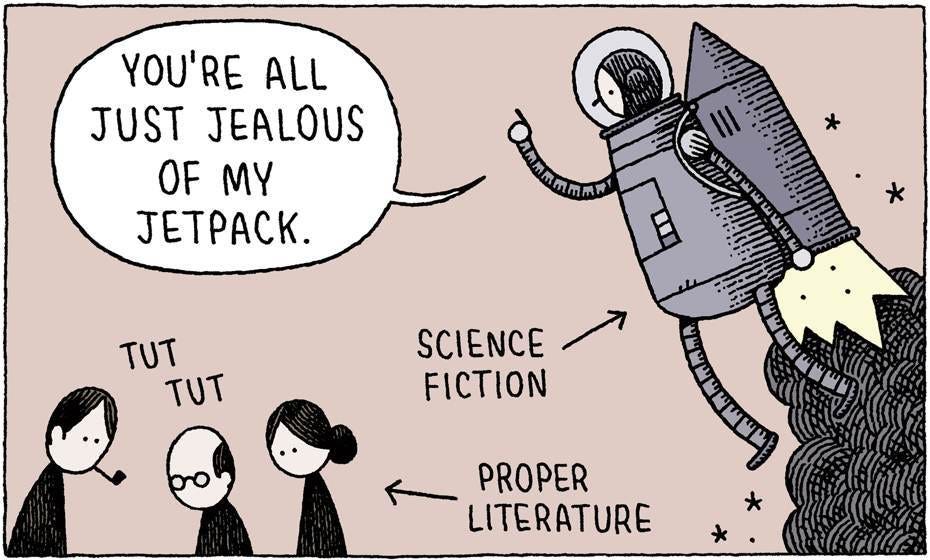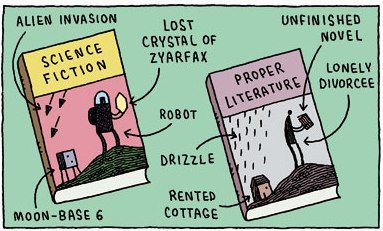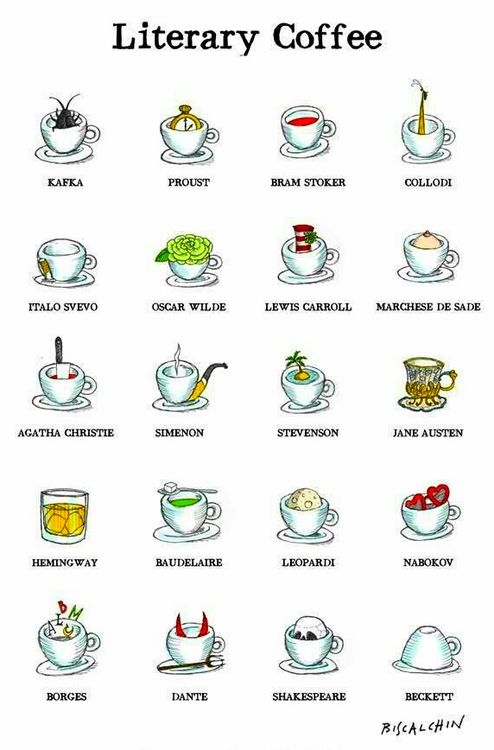 |
| https://writingcooperative.com/genre-fiction-and-developing-countries-33cde7ef92a5 |
A Sense of Doubt blog post #1919 - Genre: High and Low Suspense
Here's some examination of writing process.
I am trying to keep Wednesday devoted to fiction writing. How am I doing so far? Last week, I featured
A Sense of Doubt blog post #1912 - How to KILL our darlings,
which is not the greatest writing thing I have ever featured but it's a start to re-invigorate this weekly theme.
I have been working on fiction since the shelter in home pandemic began. Actually, my return to fiction writing began over Christmas break as I have described previously:
A Sense of Doubt blog post #1780 - "God is an Iron" by Spider Robinson
also this one
A Sense of Doubt blog post #1782 - Writing 15 minutes a day and more with Chuck Wendig.
In Post #1780, I described searching for a story I remembered reading years and years ago even though all I remembered was the author's name and the opening scene. And with some dedicated Internet searching, I found the story.
I have been intrigued lately in a trend in genre fiction to "re-imagine" someone else's story, such as Victor LaValle's Ballad of Black Tom, which reimagines Lovecraft's "The Horror at Red Hook" by subverting it. The story won many awards:
One of NPR's Best Books of 2016, winner of the Shirley Jackson Award, the British Fantasy Award, the This is Horror Award for Novella of the Year, and a finalist for the Hugo, Nebula, Locus, World Fantasy, and Bram Stoker Awards.
I had been thinking of a kind of mash up of ideas, re-mixed, re-imagined, and shuffled so as to avoid being overtly derivative.
I found the Spider Robinson story as I wrote in Post #1780, which was "God is an Iron" and I cannot believe that I had forgotten that line. The other two are "It's Such a Beautiful Day" by Isaac Asimov and “The Professor’s Teddy Bear” by Theodore Sturgeon, though I was thinking of gleaning elements from
“Supertoys Last All Summer Long” by Brian Aldiss
basis of the film AI
https://en.wikipedia.org/wiki/Supertoys_Last_All_Summer_Long
FULL TEXT:
https://brianaldiss.co.uk/writing/story-collections/collections-r-z/supertoys-last-all-summer-long/
“I Always Do What Teddy Says” by Harry Harrison
This is an article about robot teddy bears
https://sci-techmaven.io/superposition/society/our-children-always-do-what-teddy-says-4N2gokVjzEuE2Fa1LIfNRg
I was still working on the ideas when the pandemic began. hmmmm, a PANDEMIC. And suddenly, I had the story. ALL OF IT. I am sure I am one of a million aspiring writers working on some kind of pandemic story right now. Not super original, I know. Though I hope my take on it will be.
So far the only thing that has really survived is the teleporter from "It's Such a Beautiful Day." I might keep the wire-head thing but I re-imagined it significantly so it's not the same or the same scenario.
Also, I am inspired by TOR's publication of novellas like Binti by Nnedi Okorafor or All Systems Red
by Martha Wells, both of which won the HUGO for novella.
I was already toying with a novella-length story (about 80-120 pages) and then a pandemic story basically congealed in fully-formed protoplasm in my mind.
I am still writing the story both in the actual fiction prose of the narrative and the world building, which I may do in a historical analysis of Twenty-First Century pandemics, of which the one I am writing about, Xevid-33, is not the first but may be the last.
All this is preface for today's share, which is itself a share on another blog, written by author Harry Connolly and shared on Charles Stross' blog: Charlie's Diary. BTW, Charlie won a Hugo for his novella "Equoid" in 2014, which is set in his Laundry Files universe.
The article concerns genre writing: high and low thrillers. Connolly then goes on to explain how his thought experiment resulted in his novel: One Man: a City of Fallen Gods.
It's a short bit to read and makes some good points worth thinking about. Thanks for reading my blog, too (as Connolly thanks you below).
http://www.antipope.org/charlie/blog-static/2020/01/too-many-thoughts-about-genre.html
Posted by at 16:06 on January 7, 2020
AND......................... this just here because it has to be somewhere and I wasn't done reading it.
https://www.wired.com/beyond-the-beyond/2020/05/farewell-beyond-beyond/
+++++++++++++++++++++++++++++++++++++++++++++++++++++++++++++++++++++++
+++++++++++++++++++++++++++++++++++++++++++++++++++++++++++++++++++++++
+++++++++++++++++++++++++++++++++++++++++++++++++++++++++++++++++++++++
- Bloggery committed by chris tower - 2005.20 - 10:10
- Days ago = 1782 days ago
- New note - On 1807.06, I ceased daily transmission of my Hey Mom feature after three years of daily conversations. I plan to continue Hey Mom posts at least twice per week but will continue to post the days since ("Days Ago") count on my blog each day. The blog entry numbering in the title has changed to reflect total Sense of Doubt posts since I began the blog on 0705.04, which include Hey Mom posts, Daily Bowie posts, and Sense of Doubt posts. Hey Mom posts will still be numbered sequentially. New Hey Mom posts will use the same format as all the other Hey Mom posts; all other posts will feature this format seen here.
I have been working on fiction since the shelter in home pandemic began. Actually, my return to fiction writing began over Christmas break as I have described previously:
A Sense of Doubt blog post #1780 - "God is an Iron" by Spider Robinson
also this one
A Sense of Doubt blog post #1782 - Writing 15 minutes a day and more with Chuck Wendig.
In Post #1780, I described searching for a story I remembered reading years and years ago even though all I remembered was the author's name and the opening scene. And with some dedicated Internet searching, I found the story.
I have been intrigued lately in a trend in genre fiction to "re-imagine" someone else's story, such as Victor LaValle's Ballad of Black Tom, which reimagines Lovecraft's "The Horror at Red Hook" by subverting it. The story won many awards:
One of NPR's Best Books of 2016, winner of the Shirley Jackson Award, the British Fantasy Award, the This is Horror Award for Novella of the Year, and a finalist for the Hugo, Nebula, Locus, World Fantasy, and Bram Stoker Awards.
I had been thinking of a kind of mash up of ideas, re-mixed, re-imagined, and shuffled so as to avoid being overtly derivative.
I found the Spider Robinson story as I wrote in Post #1780, which was "God is an Iron" and I cannot believe that I had forgotten that line. The other two are "It's Such a Beautiful Day" by Isaac Asimov and “The Professor’s Teddy Bear” by Theodore Sturgeon, though I was thinking of gleaning elements from
“Supertoys Last All Summer Long” by Brian Aldiss
basis of the film AI
https://en.wikipedia.org/wiki/Supertoys_Last_All_Summer_Long
FULL TEXT:
https://brianaldiss.co.uk/writing/story-collections/collections-r-z/supertoys-last-all-summer-long/
“I Always Do What Teddy Says” by Harry Harrison
This is an article about robot teddy bears
https://sci-techmaven.io/superposition/society/our-children-always-do-what-teddy-says-4N2gokVjzEuE2Fa1LIfNRg
I had been working to distill the ideas to their essence. I wanted the opening scene in "God is an Iron" with the dying wire head and all the shit and vomit along with the teleporters of "It's Such a Beautiful Day" and the robot teddy bear from the Sturgeon story. But I had not found the through line, the interconnector for all of it that gave it substance and meaning.
So far the only thing that has really survived is the teleporter from "It's Such a Beautiful Day." I might keep the wire-head thing but I re-imagined it significantly so it's not the same or the same scenario.
Also, I am inspired by TOR's publication of novellas like Binti by Nnedi Okorafor or All Systems Red
by Martha Wells, both of which won the HUGO for novella.
I was already toying with a novella-length story (about 80-120 pages) and then a pandemic story basically congealed in fully-formed protoplasm in my mind.
I am still writing the story both in the actual fiction prose of the narrative and the world building, which I may do in a historical analysis of Twenty-First Century pandemics, of which the one I am writing about, Xevid-33, is not the first but may be the last.
All this is preface for today's share, which is itself a share on another blog, written by author Harry Connolly and shared on Charles Stross' blog: Charlie's Diary. BTW, Charlie won a Hugo for his novella "Equoid" in 2014, which is set in his Laundry Files universe.
The article concerns genre writing: high and low thrillers. Connolly then goes on to explain how his thought experiment resulted in his novel: One Man: a City of Fallen Gods.
It's a short bit to read and makes some good points worth thinking about. Thanks for reading my blog, too (as Connolly thanks you below).
 |
| https://blackchicklit.com/genre-fic-vs-lit-fic/ |
http://www.antipope.org/charlie/blog-static/2020/01/too-many-thoughts-about-genre.html
Posted by at 16:06 on January 7, 2020
Too Many Thoughts About Genre
In one of my previous guest stints on Charlie's blog, I wrote a post about low thrillers and high thrillers. If you don't want to click through and read the whole thing, here's the Twitter version: high thrillers deal with seats of power and show the inner workings of government agencies/other powerful organizations as they deal with large scale dangers like coups d'etat or bio-terrorism, while low thrillers deal with ordinary citizens facing smaller threats, like professional criminals or a serial killer.
Those distinctions were at the front of my mind when I sat down to write One Man: a City of Fallen Gods Novel. I wanted to try an experiment, to create a fantasy that felt huge, but had very small stakes. No Dark Lord. No invading demon army. No impending magical cataclysm.
I wanted to write a story about a nine-year-old girl who gets kidnapped by gangsters because of something stupid her mother did, and about her neighbor--a man bearing many old scars, not all of them visible--who tries to rescue her. That was it. The stakes are one life, an orphaned little girl in a city full of them. A girl with only one person left in the world who cares what happens to her. But, with magic. A fantasy version of a low thriller.
 |
| https://writerswrite.co.za/the-17-most-popular-genres-in-fiction-and-why-they-matter/ |
My agent was (understandably) a little leery about this. Fantasy readers like big stakes, she said. It's part of the appeal of the genre. And, since I take her advice seriously, I promised that the book would have big consequences: murders, gang wars, noble families scheming against each other, the whole bit. The stakes for our protagonists might be small, but the repercussions of his actions would not.
Now, I know some people reading this are thinking Low fantasy. He's talking about low fantasy right now. To me, low fantasy, which has a long history within the genre, has much more in common with a crime thriller than what I'm calling a low thriller. Low fantasy almost always has criminals as protagonists--thieves, assassins or drug dealers--and they're often proactive heroes instead of the usual reactive ones. Also, the stakes usually escalate by the midpoint or sooner, but never mind that. To me, they're closely related sub-genres, but they have distinctive tones.
The other little experiment I wanted to try was to take out the travelogue aspects of the genre. Except for a handful of flashback scenes, the action of the novel takes place within the confines of a single city, called Koh Salash. There are no mountains to cross, no "exotic" foreign cities, no mysterious forests filled with even more mysterious pseudo-allies. Instead, I took everything I thought would be cool in a fantasy novel and either crammed it into one place or turned it into enigmatic rumors of magic and danger in far-off places.
So, bourgeois vampire hobbit? There's a scene with one of those. Terrible weapons of inhuman craftsmanship? Throw a couple of those into the mix. Dead gods? Have the characters walk on their bones. Sleeping giants whose flesh, when cut and eaten, granted incredible healing powers? Let's make those central to the larger plot.
But the force that drives the story forward is just one damaged guy trying to save an orphaned little girl, and while the whole kingdom/world/universe is not at stake, he is desperate to succeed nonetheless.
 |
| https://www.editorialdepartment.com/a-history-of-the-great-divide-literature-vs-genre-fiction/ |
Here's a description of the book, taken from the back cover:
---
One Cursed City. Two Dead Gods. Ten Thousand Murderers and Thieves. One Orphaned Girl.
As a child, Kyrioc was groomed to be the head of one of the most powerful noble families in Koh-Salash, a city built inside the skeletons of two murdered gods. Kyrioc himself dreamed of becoming head of the High Watch, the highest political position in the land.
Those dreams have turned to dust.
Presumed dead after a disastrous overseas quest, Kyrioc now lives in a downcity slum under a false name, hiding behind the bars of a pawnshop window. Riliska, a nine-year-old pickpocket who sells stolen trinkets to his shop, is the closest thing he has to a friend.
When a criminal gang kills Riliska's mother and kidnaps the little girl, Kyrioc goes hunting for her.
He doesn't care about the forbidden magic the gangs are fighting over--the severed ear of a glitterkind, a creature whose flesh contains astonishing healing powers. He doesn't care about the bloody, escalating gang violence. He doesn't care about the schemes of power-hungry nobles.
In a raging city on the verge of civil war, Kyrioc only wants to save his friend. He will risk anything for her, even awakening the powers that murdered the gods so long ago.
"One Man is a superbly realised story set in a rich and fascinating world. The horror grips, the fantasy delights and the characters remain vivid and real to the end." -- Justina Robson
---
Was this little experiment a good idea? Readers will have to be the judge of that, and early reviews have been kind. All I know is, if you'd asked me last year what book I was most proud of, I would have said Circle of Enemies, the last of the Twenty Palaces books that Del Rey released. Now I would point to One Man.
You can read sample chapters from the usual ebook vendors or on my website.
I hope you like the book, and if you do, I hope you tell your friends. Thanks for reading
 |
| https://www.how-to-write-a-book-now.com/what-is-genre.html |
AND......................... this just here because it has to be somewhere and I wasn't done reading it.
https://www.wired.com/beyond-the-beyond/2020/05/farewell-beyond-beyond/
+++++++++++++++++++++++++++++++++++++++++++++++++++++++++++++++++++++++
+++++++++++++++++++++++++++++++++++++++++++++++++++++++++++++++++++++++
+++++++++++++++++++++++++++++++++++++++++++++++++++++++++++++++++++++++
- Bloggery committed by chris tower - 2005.20 - 10:10
- Days ago = 1782 days ago
- New note - On 1807.06, I ceased daily transmission of my Hey Mom feature after three years of daily conversations. I plan to continue Hey Mom posts at least twice per week but will continue to post the days since ("Days Ago") count on my blog each day. The blog entry numbering in the title has changed to reflect total Sense of Doubt posts since I began the blog on 0705.04, which include Hey Mom posts, Daily Bowie posts, and Sense of Doubt posts. Hey Mom posts will still be numbered sequentially. New Hey Mom posts will use the same format as all the other Hey Mom posts; all other posts will feature this format seen here.
No comments:
Post a Comment